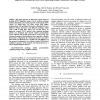Free Online Productivity Tools
i2Speak
i2Symbol
i2OCR
iTex2Img
iWeb2Print
iWeb2Shot
i2Type
iPdf2Split
iPdf2Merge
i2Bopomofo
i2Arabic
i2Style
i2Image
i2PDF
iLatex2Rtf
Sci2ools
ICPR
2010
IEEE
2010
IEEE
Improved Mandarin Keyword Spotting Using Confusion Garbage Model
This paper presents an improved acoustic keyword spotting (KWS) algorithm using a novel confusion garbage model in Mandarin conversational speech. Observing the KWS corpus, we found there are many words with similar pronunciation with predefined keywords, although they have different Chinese characters and different meanings, which easily result in high false alarm rate. In this paper, an improved acoustic KWS method with confusion garbage models was developed that absorbs similar pronunciation words confused with specific keywords for a given task. One obvious advantage of such method is that it provides a flexible framework to implement the selection procedure and reduce false alarm rate effectively for a specific task. The efficiency of the proposed architecture was evaluated under HMM-based confidence measures (CM) methods and demonstrated on a conversational telephone dataset. Keywords-keyword spotting; similar pronunciation; confusion garbage model; confidence measure
| Added | 12 Feb 2011 |
| Updated | 12 Feb 2011 |
| Type | Journal |
| Year | 2010 |
| Where | ICPR |
| Authors | Shilei Zhang, Zhiwei Shuang, Qin Shi, Yong Qin |
Comments (0)

